Breadcrumb
Teaching The Children of Willesden Lane: A Concluding Discussion
At a Glance
Language
English — USSubject
- English & Language Arts
- History
- The Holocaust
Teaching The Children of Willesden Lane: A Concluding Discussion
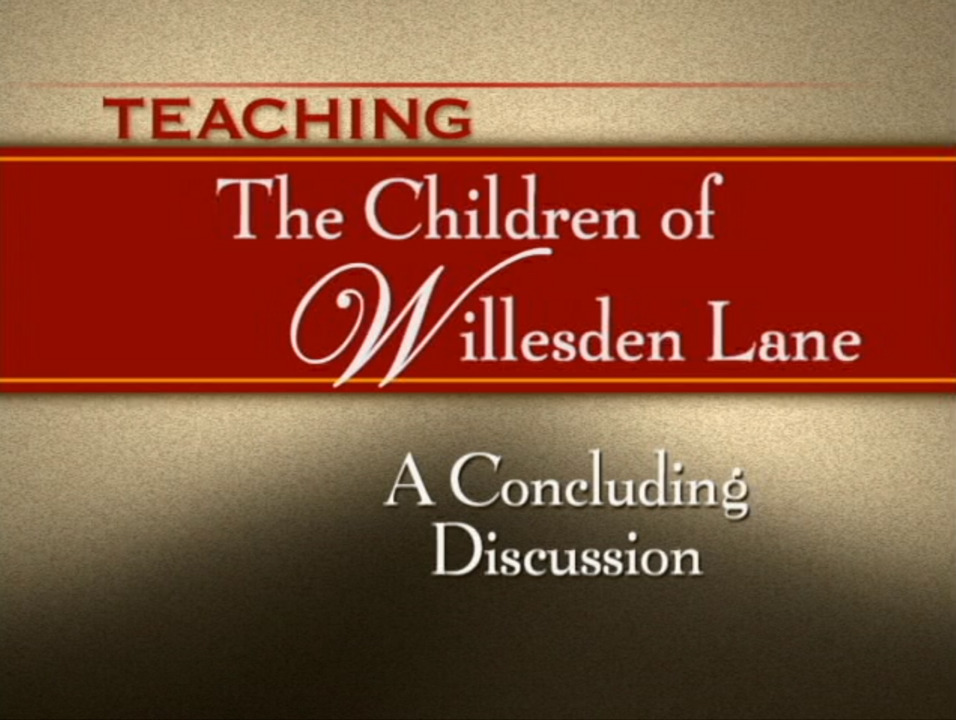
[MUSIC PLAYING]
When a teacher encounters The Children of Willesden Lane and wants to use it in his or her classroom, they might approach the book with some trepidation, some fears that it will introduce or bring up some themes or discussions that could cause potential heated debates in their classrooms. And it's my responsibility, I think, to ask questions that will get them talking.
When we look at a story such as this, we can't dismiss the magnitude of what took place. And I want to hear from some of you about how do you feel connected to or disconnected to a story such as this.
I feel very connected to Aaron, once he returns from fighting, how he can't even put himself in the real world that is now there because he's so altered. And I know a lot of the people in the war today will come back and can't live the lives that they had had before.
I actually, in a way, feel disconnected with the fact of this whole story. Well, not the whole story. But because I never really went through losing somebody or losing a family member so close to me, such as my parents or my sister, and feeling how something such as great as music can really help me through that.
Having an open discussion, such as this, gives students the opportunity to bounce ideas off of their peers. This is a controlled environment, and I think they feel safe and comfortable.
Let me ask you this, though, is this a means of righting the wrongs of the past? Do we need to keep revisiting this?
I think we do need to keep revisiting it just to prevent it from happening in the future, possibly. Knowing that actually happened just makes me not want it to happen more and to prevent it at all costs.
You have to keep revisiting the past because you make the same mistakes over. But when you revisit the past, you learn from it. And you never want to give up on stories like this because they're all different. Everybody has their own twist to it. And if one story doesn't touch you, maybe a different one will. And if it's happening again in a new situation, you could use stories like this to show how it parallels the situation, and maybe, it'll help open somebody else's eyes.
We keep revisiting this concept with the hopes of it not happening again, and it is indeed still happening. We still face these problems in our world. There's still actions like this taking place. Do we move on, though? I mean, how do people move on from this?
I feel like they haven't moved on because it was such a serious part that happened to them in their life. And if they could teach their generations, the future, their grandchildren about it, but I don't think they'll ever move on because of what happened, and the tragedies, and things that happen to them, that, sometimes, it's hard for a person to forget something so serious.
I think, in a way, that they have moved on just because that they're able to write books about it. They're able to tell stories about it. I think that's a way of moving on to get past it.
I don't think that we will ever fully get away from it. There's always going to be discrimination. There's always going to be persecution. It's just how our society is. There's not equality. There's always going to be somebody or something who is higher up or who would consider themselves better than you.
So we allow this to continue?
Well, personally, I don't really know how to stop it. I don't know. I think it's like a vicious cycle, and it just repeats itself. I don't know if there really is an end to it.
It's not easy being an individual and leading the pack, if you will, as opposed to just getting in the pack and following along.
I think some people think that even if you do stop-- say, a person was teasing another person. If you stop, then they're going to tease you. And when they're not teasing you, they're still going to be teasing someone else. So some people would think why stop it when it's just going to happen to you? And then, they're just going to keep moving on to another person, another person.
I just think that people are afraid to use the power that they have because it could just backfire on them, and they just don't want that to happen. They want to preserve themselves. That's natural. People want to--
I think that if at least one person speaks up, then a whole bunch of people will come out of the woodwork and get their back on it. Because when somebody is picking on someone, you know everyone disagrees with it, except for that one person, who's like the evil person.
And if you have the guts to stand up and stop it, even if they turn it on you, if you're a strong person, you won't even care. It's not something that should matter to you. But if you make, at least, one person feel better, I mean, it's worth it.
But I don't think it could really be compared to what happened in Germany, Nazi Germany. Because if you stood up for-- if you stood up for a Jew, then you would be killed. You wouldn't just be persecuted by your fellow students. You would also be dead.
We talked about helping somebody in a situation or turning our back and walking away. How do we get people to stop walking away?
It's easy to say I don't have to deal with this. But when we read books like these, we're really learning how to take other people into consideration, and it's what teaches us not to do this again.
Do you think it can happen again?
Yes, I do.
How?
By people being ignorant people, saying that's not our problem. It will stop. Someone there will fix it. It took us a very long time and for the wrong reasons to get involved with it-- United States to get involved with this. We were not involved until it affected us directly. And I feel that people don't stand up and move until they're pushed.
Because we had a personal interest.
Right.
Well, don't we have a personal interest in any of these problems when you talk about humanity?
I don't really think it is our country's responsibility to be saving all these other countries. I mean, we went over to Iraq to get rid of Saddam Hussein. And now, he's out of there, and men of ours are just dying every day because these people are still horrible down there, and they still believe in terrorism because you can't stop it.
Can't stop hatred?
No.
No? How many people-- Molly, don't misunderstand me. I'm not picking on you. How many people agree with that? You can't stop hatred? Pat, you can't stop hatred?
I think you can eventually break it down slowly. And eventually, more people get less ignorant. Maybe just put the knowledge out there through books like this. And eventually, maybe, we'll move closer, but I don't think we can ever get rid of it completely.
A lot of times, I will remove myself and I will stay as an observer. I don't do that right away because I need to, in the beginning of the year, establish ground rules, and we need to practice what open discussion looks like and how it is to be fair to listen to somebody else's words, et cetera. But when I know they're comfortable with one another, I will walk away.
Who is responsible?
I think that we are actually held responsible for what happened because one person will say, well, I don't like this race, so let's get rid of them. Well, we're the people. We're following this person saying, well, I agree with you. Let's get rid of it. So it's actually our duty to actually stand up and say, well, that's the wrong thing.
I think a lot of the Nazi soldiers didn't agree with what happened. But a lot of times, they were afraid to speak up because then they would be killed, too. But I think every human being is responsible for every other human being. It's just part of being alive and trying to take care of everybody. I mean, it's only natural.
I think it was more of an idea that is responsible, like just the idea of superiority over one another is more-- it's more an idea's responsible for why it happened rather than one person or one group of people. It was an idea that someone came up with and that other people just had to follow for one reason or another.
But there has to be somebody enforcing that idea. No one's just going to see this idea and be like, oh, well, I guess, that's mandatory. We have to do that. If somebody is not forcing it on them, they're not going to do it unless they agree with it because then they're responsible for it or whoever's forcing them on it is responsible for it. There's always somebody responsible. You can't just say it's an idea. Somebody came up with the idea.
They don't have any reason to be mad still then because the one person to blame, who would be Hitler, he's dead. They shouldn't be mad at other people for not jumping in if they want to blame one person.
Hitler wasn't the only person that completely agreed with the idea. So I mean, there are other people that are still alive that could be held accountable for it. I mean, he wasn't the only full fledged Nazi out there. If he didn't have any support, he would not have gone anywhere with the idea. Because then, everybody else would have deposed him and gotten rid of him.
When students disagree, I think it's the obligation of the moderator of the discussion to intervene, but not until the disagreement becomes disrespectful or if a student is deliberately trying to intimidate or antagonize another student. I felt that the dialogue that was taking place eventually would begin to tone down a bit, and I and I knew that both students were pretty respectful of one another's ideas and opinions. But they felt also very strongly about their own opinions and ideas, and they wanted to make that clear.
Personally, I believe that the topic that really hasn't been gone over yet is this is all centering around the idea of responsibility, and responsibility itself is an opinion, I believe. So it depends on what you believe your personal responsibility is. And unfortunately, during this time period of the war going on, I believe that some countries were-- not oblivious that they knew it was happening, but was it their responsibility? It was the question. Of course, there are groups in every country who believed it was, and there were groups that didn't.
I think knowledge makes it your responsibility. If I saw Bob, and Bob told me that he was going to get beat up after school. My knowing of that would make it my responsibility to do something to stop it. I think if you were standing in a room, and even if it was a stranger, but you saw them being picked on or about to be harmed, that makes it your responsibility because you have knowledge of it going on. I think that knowledge makes it your responsibility.
Asking students to reflect upon what any of this has to do with them, with our current culture today really makes them sit back and think about it.
The people that are gone, they're gone. There's nothing that can be done to bring them back. But we can also-- we can't correct the situation because it's over, and this cannot be corrected. But it can be ensured that it'll never happen again, which is I believe is the best thing that can be done.
Teaching The Children of Willesden Lane: A Concluding Discussion
You might also be interested in…
Holocaust and Human Behavior: A Facing History & Ourselves High School Elective Course
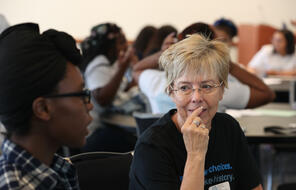
Three Good Things

Slow Down with The Slowdown
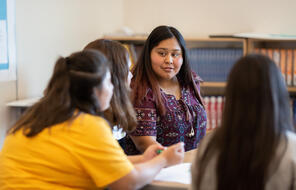
Take a Stand
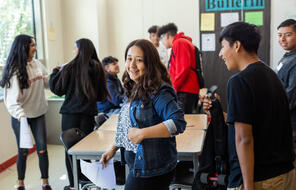
Appreciation, Apology, Aha
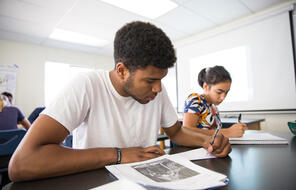
Closing Challenge
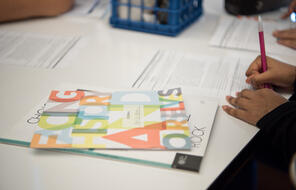
Looking Back, Looking Ahead

Our Names and Our Place in the World
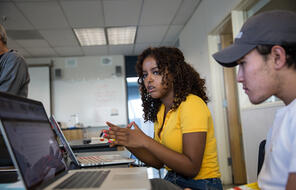
Making Meaning of Community

Emoji Emotions
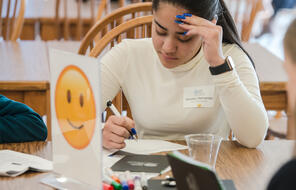
Picture This



